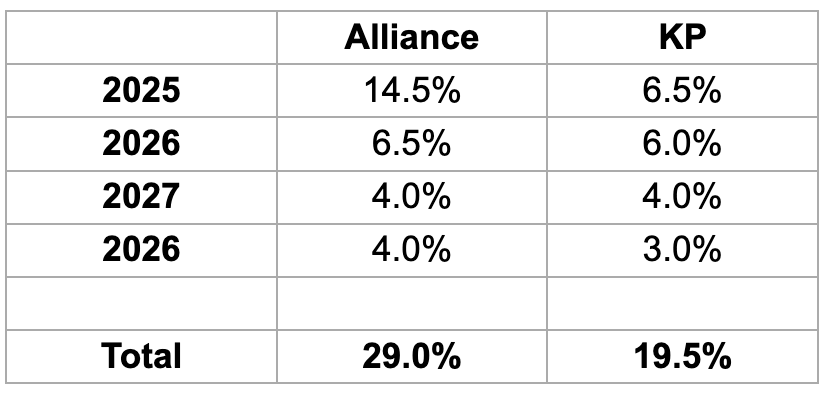This past week, we continued national bargaining with Kaiser Permanente alongside the Alliance of Healthcare Unions. While we are proud of the progress we have made, we remain far apart on many of the issues that matter most to our members.
Economics
The Alliance economic subgroup met with Kaiser Permanente (KP) on Monday and Wednesday. KP made no meaningful movement toward our goal of restoring fairness to our wages. High inflation and recent contract settlements in our region have left Kaiser scrambling to fill open positions while our members struggle to keep up.
Instead of countering on wages, Kaiser offered a 1% one-time lump-sum contribution to individual retirement accounts. This proposal is baffling. As an Alliance, we have never expressed interest in this idea, and we have no interest in it now. A one-time contribution to retirement accounts is not a substitute for fair wages.
On wages, we continue to stand firm until we see real movement at both the national and local tables.
Beyond across-the-board raises, the Economic Subgroup did reach two tentative agreements:
- A new minimum wage that will deliver life-changing raises for many Alliance members.
- Increased contributions to union trusts that will strengthen benefits for our Operating Engineer siblings.
While we celebrate these agreements, we remain steadfast in our shared commitment to restoring wage fairness and winning a contract our members and patients deserve.

AI and Technology
The Alliance subgroup on Artificial Intelligence (AI) and Technology made significant progress this week at national bargaining. After many hours of challenging negotiations, labor and management reached consensus on language that addressed both parties’ interests. As noted in our previous update, the subgroup agreed to establish a national task force on AI and to strengthen the UBT structure to ensure communication and feedback from the front lines.
The subgroup has since developed the following additional recommendations:
- Preserving the relational aspects of patient care, such as maintaining human touch, compassion, and harnessing the expertise of frontline workers.
- Ensuring the employee voice is taken into account when adopting new technologies.
- Prioritizing the ethical, safe, and principled deployment of AI and technology in a way that reflects partnership values.
The CIC as a whole considered these recommendations and came to consensus on supporting them. These are historic tentative agreements that will protect our frontline workers and ensure we have a voice in how we do our work as AI and related technologies rapidly advance. Your labor representatives on the AI and Technology subgroup are incredibly proud of these accomplishments, and we look forward to sharing the final language once it is completed.
Staffing and Patient Care
Bargaining for this subgroup was incredibly frustrating, as management spent 90% of the week in caucus rather than problem-solving with the Alliance. They have had our proposal for more than two weeks, which called for collaboration whenever patient care templates and work schedules are changed. When they finally countered, it was with a flat refusal to commit to collaborative dialogue on patient scheduling—along with a new prohibition on grieving or disputing these decisions.
We have worked hard to stay true to Partnership, but even for management, refusing to commit to simply talking with us is flabbergasting and offensive. While every other national subgroup except economics has finished its work, the CIC has directed the Staffing and Patient Care subgroup to return and deliver on our charter requirements.
Partnership Effectiveness
The Partnership Effectiveness Subgroup has wrapped up its work with a set of final recommendations designed to strengthen accountability and support our Unit-Based Teams (UBTs). These recommendations also ensure that our partnership language reflects the way the work is actually done today.
The Common Interests Committee has approved recommendations that include:
- Labor engagement in tracker updates: Labor will be engaged and have meaningful input whenever the UBT tracker is updated or enhanced.
- Sample agendas for UBT meetings: Sample agendas will be included in the National Agreement to guide teams in having more comprehensive meetings.
- Instructor-led LMP trainings: LMP trainings will remain instructor-led to ensure quality and consistency.
- Improved tracking of core LMP classes: Systems will be strengthened to better track and report on participation in core LMP classes.
These changes are about more than simply checking boxes. They are about making our partnership real in the daily experience of frontline workers and ensuring that labor’s voice is central in shaping how this work moves forward.
What’s Next
Next week we will continue at local bargaining, so sign up to be an observer. We will return to national bargaining September 8–12. We will also begin preparing to launch strike pledges soon, so stay connected with your CAT leaders as we announce informational sessions and opportunities to participate.
It’s time to ratchet up the pressure and show Kaiser that we will do whatever it takes to win a fair contract and a strong future for patient care.
